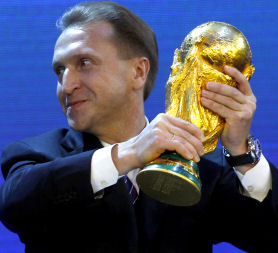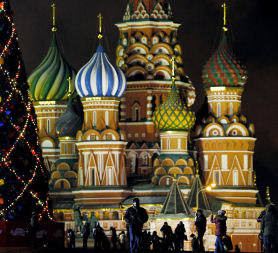World Cup 2018: what it means for Russia
As England’s failed World Cup bid is dissected, football writer Jonathan Wilson looks to Russia, and what hosting the competition will mean for the country and the fans travelling there.

“England,” ran an article in a Russian newspaper last week, “has great stadiums, great infrastructure, great clubs, great fans. Does it really need a World Cup?”
It’s a strange world in which having the facilities to host a tournament well is seen as a negative, but Fifa’s desire to spread the gospel to new territories is all-consuming.
England may rage about the iniquities of the bidding process and how unfair it is that it hasn’t hosted a World Cup since 1966, but eastern Europe has never hosted the tournament despite producing 11 semi-finalists: 88 years after the first World Cup, it was probably about time.
Russia remains the great unknown on the edge of Europe.
Vladimir Putin has said that hosting the World Cup will cost Russia $6.2billion, but it is a state that can afford to pay, and the investment in public works and public relations is probably seen as worthwhile.
Russia remains the great unknown on the edge of Europe, and attracting an estimated half a million visitors over a month in 2018 can only help that.
Even better, as far as Putin is concerned, many will not only visit the major hubs of Moscow and St Petersburg, but will head into lesser-known areas – Krasnodar, Yekaterinburg, Rostov-na-Donu – which fits his overt policy of decentralisation.
That, logically, should encourage investment in those areas, and that is particularly significant in sporting terms. Football, for a long time, was centred on Moscow.
Until 2006, only one Russia title had been won by a side from outside the capital; the last four titles have been shared between Zenit St Petersburg and Rubin Kazan.
There is an unpleasant ultra-right element in Russia, but it is a minority.
Moscow has the Luzhniki Stadium, one of the finest stadiums in the world and host of the 2008 Champions League final, St Petersburg will have a new 60,000-seater stadium by the end of next year, but elsewhere investment is desperately needed.
Of course there are major problems, the most significant of which is racism.
When Dick Advocaat was manager of Zenit St Petersburg, he said he wouldn’t dare sign a black player because he couldn’t guarantee his safety.
There is an unpleasant ultra-right element in Russia, but it is a minority. Most Russians are extremely hospitable, but there is little history of black immigration and so there are pockets of ignorance and suspicion.
Unlike South Africa…there is a rail network, and fans have been promised free travel.
Players and fans, of course, should not be placed in any situation in which there is a threat, but it may be that the World Cup forces Russian football to put its house in order in that regard.
Russian society suffers something of a persecution complex: if the world reaches out, it may be that it reaches back with a greater spirit of openness, but whether that risk should be taken is questionable.

Rail journeys
More practically, there are the distances involved. The host cities have been divided into four regional pockets to try to cut travelling, but even within those pockets journeys from city to city (Kazan to Saransk, say) could take eight or nine hours by rail.
At least, though, unlike South Africa and Brazil, there is a rail network, and fans have been promised free travel. Hotel accommodation is clearly lacking in some cities, but again the issue is no worse than it was in South Africa.
Then there are issues such as the match-fixing, that is rife in the Russian league, and human rights issues, most notably the lack of a free press.
Neither are likely to have much of an impact on the tournament itself, but that’s not really the point.
All that can be hoped is that the additional scrutiny hosting the World Cup will bring will itself lead to improvements.
Again, though, the question becomes whether the World Cup should go to the country best equipped to host it, or the one that will most benefit from doing so.
Jonathan Wilson is the author of Behind the Curtain: Travels in Eastern European Football, and writes on eastern European football for the Guardian.